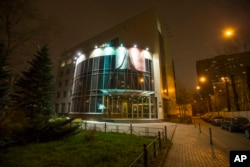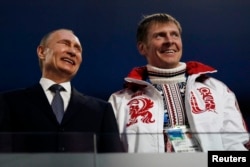Russia says allegations that its athletes were part of a widespread doping scheme are "groundless" and insists its policies strictly adhere to those of the global anti-doping agency and the International Olympic Committee. The World Anti-Doping Agency issued a report Monday implicating Russian athletes, coaches, doctors and a Moscow drug-testing laboratory in the scheme.
The World Anti-Doping Agency (WADA) suspended Moscow's drug-testing laboratory for six months on Tuesday, a day after issuing the scathing report alleging state-sponsored doping in Russian athletics.
The report accuses the laboratory of manipulating athletes' drug tests so they appear clean. WADA also alleges lab director Grigory Rodchenkov extorted money from athletes and has called for his lifetime ban.
WADA alleges Russia's Federal Security Service (FSB), the successor to the Soviet KGB, interfered in the lab's work. The report says Russian state officials must have known about the systemic doping.
At a news conference in Moscow Tuesday, the head of Russia's Anti-Doping Agency (RUSADA), Nikita Kamaev, dismissed allegations of FSB involvement. He acknowledged unspecified problems but said the country was improving and questioned the report's sources of information.
"When a word is pronounced by an athlete who had repeatedly violated rules and has been disqualified, and when his word, already after disqualification, is attributed more weight than our words, it raises questions," he said.
Calls to disqualify Russian athletes
The WADA commission recommended disqualifying several Russian athletes and coaches from international competitions. But, most significantly, it called for Russia to be banned from international athletics, including next year's summer Olympics in Brazil, until it can show that doping is no longer a problem.
Russian Athletics Federation acting president Vadim Zelichenok said a decision to suspend Russian athletes would be devastating for them.
"Speaking honestly, I cannot imagine that. Of course, it would be an enormous blow,” he said. “I repeat once again: We hope for common sense of the IAAF [the International Association of Athletics Federations] council members, who first of all must work in the interest of the sport."
The WADA report laid out systemic failures at the IAAF as well. The athletics' governing body is suffering its own scandal after French authorities accused its former chief, Lamine Diack, and other officials of fraud.
Russian officials say they would cooperate with the international sports bodies but also implied the WADA report is an anti-Russian conspiracy. Zelichenok said the report's authors were biased.
"I think that there is an element of orchestrated reports here," Zelichenok said. He added that the report described "quite a few things … in a biased way. For example, my situation – in reality it was not like that."
Russian citizens react
The official view is echoed by many Russians.
In Moscow, coffee machine repairman Dmitry Andreyev told VOA he believes countries accuse Russia whenever their own athletes cannot win.
"Sport is becoming politicized," Andreyev said. "Everyone in the world arena heckles Russia like an unwanted third party; sport is following in the same footsteps."
Pensioner Alla Afiyan agreed that the accusations are politically motivated and suggested to VOA that they could be connected to the conflict with Russia over Syria, Crimea and Ukraine.
"I heard about it on TV," she said, reflecting the reality that most Russians get information from state-controlled media. "I think it's all politics, political games against Russia, and I hope that our guys can find some arguments to prove them wrong. I'm really hoping for it, for Russia."
Musician Sergei Suvorov gave VOA a more cynical view. "I think that everyone dopes," he said. "You can't achieve anything in sports without it. Unfortunately, for some reason, Russian athletes have been caught at it lately."
The WADA commission's mandate was to report on Russian athletics, but its author, Dick Pound, said other countries and their athletes are likely doping as well.
Athletes want medals
Meanwhile, athletes who lost to the alleged drug cheats want to be awarded their medals.
Australian silver medal Olympic race walker Jared Tallent lost at the London 2012 games to Russian Sergei Kirdyapkin, who was found guilty of doping earlier this year. Tallent told reporters in Canberra he should get Kirdyapkin's gold medal.
"It makes you very angry just to know that your international federation, the sporting body that should be protecting clean athletes, was looking after the dope cheats," he said. “So, It's pretty hard to swallow, yeah, really disappointing to read that."
Russia's anti-doping agency gave Kirdyapkin a three-year, two-month suspension that only took effect in October 2012, after the London Olympics ended.
Australia's Olympic body joined others in calls for Russia's suspension from international athletics as the pressure grows on Russia's worsening sports scandal.
Earlier Tuesday, Kremlin spokesman Dmitry Peskov dismissed the report, saying it put forward “no evidence” and, therefore, was "groundless."
The WADA has asked for Russia's official response to the report by Friday, but comments from the very top could come earlier.
Peskov said the scandal might be discussed at a meeting President Vladimir Putin is scheduled to hold with the heads of Russia's sports federations on Wednesday in the resort town of Sochi, which hosted the 2014 Winter Olympics.
While the Sochi meeting was originally called to discuss preparations for the Rio 2016 games, a statement from Putin on the doping scandal would be most timely.








